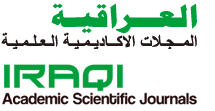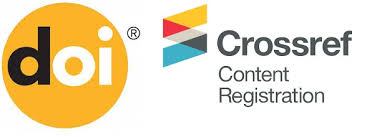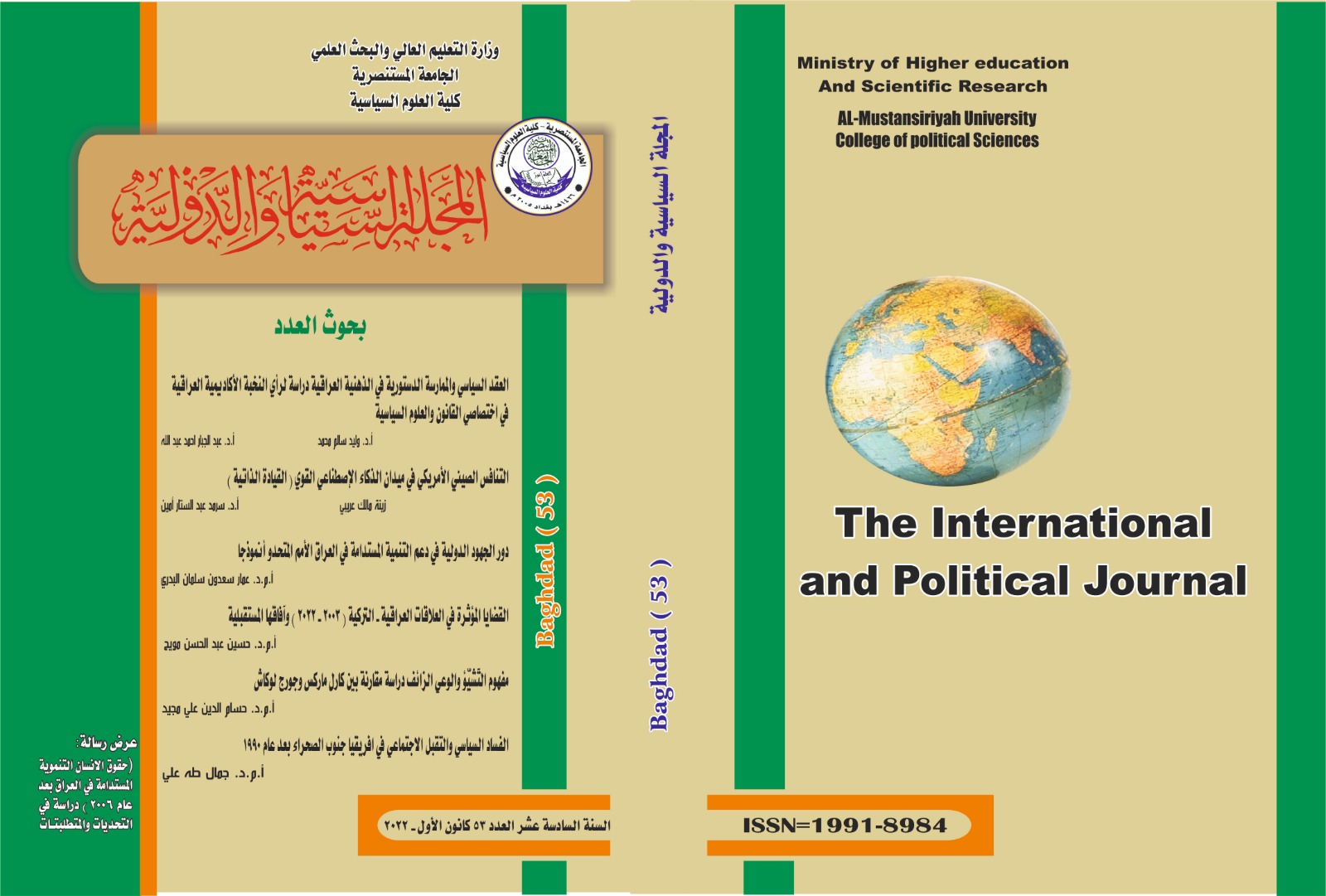The Competition of Regional Powers and its Impact on the Stability of the Middle East Region: (Iran - Israel as a Model)
DOI:
https://doi.org/10.31272/ipj.i56.242Keywords:
Competition, Regional Security, Stability, Iran, IsraelAbstract
The Middle East has become an area of regional and international competition as a result of differences between countries, which have taken on political and economic dimensions to achieve their interests and status on the regional and international arenas. This competition stems mainly from the strategic, geopolitical, and economic importance of the region, which prompted these regional powers or actors to formulate their policies and projects in a way that guarantees them the greatest expansion in the region at the expense of other countries.
Some of the active regional powers in the Middle East are multinational states such as Iran, while others need to expand and eliminate or weaken Arab states that stand against them, such as Israel. Accordingly, its presence in the Middle East region is directly linked to defining the strategic concept of the great powers, led by the United States of America, by preserving its interests and the interests of its allies in the region in addition to containing the Arab countries that oppose it.
These regional actors (Iran and Israel) have become influential actors in the Arab region as a result of several factors and variables, including soft power policy, economic strength, and high military capabilities. This competition and competition over the Middle East region is certainly supported by international actors. Israel was and is still supported by the United States of America. As for Iran, although its relationship with Russia most often reaches conflict, especially in terms of reducing its presence in Syria, it is a relationship based on cooperation. Regional competition is one of The most important challenges facing the Middle East region and still are, especially those that exist between regional actors in order to achieve their goals and strategies, and this competition has directly affected the stability of the region politically, economically, socially, culturally and security.
References
ابو خزام ، ابراهيم . 1999. الحروب وتوازن القوى . عمان : الاهلية للنشر والتوزيع .
احمد ، محمد 2007 . اوهام مشروع الشرق الاوسط الكبير .دمشق : دار الفكر .
بازي ، ريتا .2008. حلف المصالح المشتركة (التعاملات السرية بين اسرائيل وايران والولايات المتحدة الامريكية ،ترجمة امين الايوبي .بيروت : الدار العربية للعلوم ناشرون ،ط1.
التميمي ، ظفر عبد مطر .2014. الادارة الامريكية في الشرق الاوسط تفوق التوازنات الاقليمية . بغداد : دار ضفاف للنشر.
الحريري ، جاسم يونس .2018. السياسة الاسرائيلية تجاه دول مجلس التعاون لدول الخليج العربية بعد انتهاء الحرب الباردة . بغداد : مركز العراق للدراسات .العدد 134،ط4 .
حسن ، شذى زكي .2020. " الدور الامريكي الجديد في الخليج العربي في ضوء التحولات الاقليمية " . مجلة دراسات سياسية واستراتيجية . قسم الدراسات السياسية . بيت الحكمة .
خزار ، فهد مزبان . 2005 . " الجمهورية الاسلامية الايرانية ومشروع الشرق الاوسط الكبير ، رؤية تحليلية " . مجلة الدراسات الدولية . مركز الدراسات الدولية . جامعة بغداد . العدد 1ـ 2 .
الداود ، فؤاد عبد الرحمن وعبد الفتاح العريفي . 2020. " التقرير الاحصائي السنوي 2020 ". منظمة الاقطار العربية المصدرة للبترول . اوابك ـ الكويت.
الدجاني ،احمد صدقي . 2001 . الجذور التاريخية للشرق الاوسط .المركز القومي لدراسات الشرق الاوسط ، العدد 26 ،كانون الثاني.
رياض ، محمد .1979.الاصول العامة في الجغرافيا السياسية . بيروت : دار النهضة العربية .
سعد الدين، نادية . 2016. " مسارات التحول :المعادلات الامنية الجديدة في النظام الاقليمي العربي ، ملحق تحولات استراتيجية " . مجلة السياسة الدولية . العدد 205 تموز.
السعيد ، اسامة مرتضى .2017. " الولايات المتحدة الامريكية ومستقبل امن الطاقة في القرن الحادي والعشرين" . المجلة السياسية والدولية . كلية العلوم السياسية . الجامعة المستنصرية .العدد 7 .
سلطان ، جاسم .2013.الجغرافيا والحلم العربي القادم :جيوبوليتك :عندما تتحدث الجغرافيا .بيروت : تمكين للابحاث والنشر،ط1.)
عبد الحكيم ، بن يختي . 2020 . " الترتيبات الامنية ومواجهة الخطر الايراني في منطقة الخليج العربي " . الرياض: مجلة الدراسات الايرانية .العدد 11 .
عبد الله ، فراس عبد الجبار .2008. " الاهمية الاستراتيجية للبحر الاحمر في مشروع الشرق الاوسط " . مجلة الفتح ،المجلد 4 ، العدد 36.
علي ، عبد الزهرة صاحب 2019.الدور الاقليمي الايراني الفرص والتحديات . بغداد : بيت الحكمة .
الفقي ، مصطفى .2021.االعلاقات العربية الروسية :رؤى استراتيجية وتحليلية حول الدور الروسي في المنطقة العربية . القاهرة: مكتبة الاسكندرية .
فلاح ، سعد مجبل . 2013 . " البرنامج النووي الايراني واثره على السياسة الخارجية الكويتية للفترة (2003 ـ 2012 )" ، رسالة ماجستير . جامعة الشرق الاوسط . كلية الاداب والعلوم . قسم العلوم السياسية .الاردن .
قرم ، جورج .2010. تاريخ الشرق الاوسط من الازمنة القديمة حتى اليوم ، ط2 .بيروت : شركة المطبوعات للتوزيع والنشر .
كيمن، فؤاد . 2014 . " توجهات تركيا وايران في الشرق الاوسط سياسات ومصالح ،سلسلة محاضرات الامارات " . مركز الامارات للدراسات والبحوث الاستراتيجية ،ط1 .
محمود ، صدفة محمد . 2018 . " توظيف القوة الذكية في السياسات الخارجية للقوى المتوسطة الصاعدة ،ملحق توجهات استراتيجية " . مجلة السياسة الدولية . العدد 212 . نيسان .الاهرام , القاهرة .
المركز الاوربي لدراسات مكافحة الارهاب والاستخبارات .2021. " الناتو في العراق قراءة عسكرية في الابعاد الاستراتيجية والعملياتية" . المانيا ـ هولندا .
المشاط ، عبد المنعم . 2012 . " تأثيرالثورات العربية في العلاقات الاقليمية في الشرق الاوسط ،ملحق اتجاهات نظرية " . مجلة السياسة الدولية .العدد 189. تموز.
المعرفة الالكترونية . 2023 . مركز الامارات للدراسات والبحوث الاستراتيجية ،الامارات العربية . https://search.emarefa.net/detail/BIM
الهواري ، عبد القادر .2013. الثورات العربية بين المصالح الامريكية والاسرائيلية والاحلام الايرانية والقطرية .القاهرة : الهيئة العامة لقصور الثقافة.
وهب ، علي .2013. الصراع الدولي للسيطرة على الشرق الاوسط /التأمر الامريكي ـ الصهيوني . بيروت : شركة المطبوعات للتوزيع والنشر ،ط 1 ،2013.
وهيب ، حسين حافظ .2008. " الطموح النووي الايراني ومستقبل الامن الاقليمي في منطقة الخليج العربي " . دورية اوراق دولية . مركز الدراسات الدولية ،جامعة بغداد ،العدد 161 .كانون الثاني. ص 11.
ويكيبيديا . 2023 . " العلاقات الاسرائيلية السعودية ". 12/5/2023 ar.m.wikipedia.org
يحيى ، ربيع محمد .2013." إسرائيل و خطوات الهيمنة على ساحة الفضاء السيبراني في الشرق الأوسط : دراسة حول استعدادات و محاور عمل الدولة العبرية في عصر الإنترنت ( 2002-2013 ) " . مجلة رؤى استراتيجية. المجلد3. العدد4. حزيران 2013. ص68.
المصادر باللغة الانكليزية
Abdul Hakim, Bin Yakhti. 2020. "Security Arrangements and Confronting the Iranian Threat in the Arabian Gulf Region." Riyadh: Journal of Iranian Studies, Issue 11.
Abdullah, Firas Abdul-Jabbar, 2008. "The strategic importance of the Red Sea in the Middle East project." Al-Fath Journal, Volume 4, Issue 36.
Abu Khuzam, Ibrahim. 1999. alhurub watawazun alquaa [Wars and the Balance of Power]. Amman: Al-Ahlia for publishing and distribution.
Ahmed, Mohamed 2007. awham mashrue alsharq alawasat alkabir [Illusions of the Greater Middle East Project]. Damascus: Dar Al-Fikr.
Al-Daoud, Fouad Abdel-Rahman and Abdel-Fattah Al-Arifi. 2020. “Annual Statistical Report 2020.” Organization of Arab Petroleum Exporting Countries. OAPEC - Kuwait.
Al-Fiqi, Mustafa. 2021. Arab-Russian Relations: Strategic and Analytical Insights on the Russian Role in the Arab Region. Cairo: Library of Alexandria.
Al-Hawari, Abdel-Qader. 2013. althawrat alearabiat bayn almasalih alamarikiat walasarayiyliat walahlam alayranyat walqataria [The Arab revolutions between American and Israeli interests and Iranian and Qatari dreams]. Cairo: The General Authority for Cultural Palaces.
Ali, Abdul Zahra Sahib 2019. aldawr alaqalimi alayrani alfuras waltahadiyat [The Iranian regional role, opportunities and challenges]. Baghdad: House of Wisdom.
Al-Mashat, Abdel Moneim. 2012. "The Impact of the Arab Revolutions on Regional Relations in the Middle East, Appendix Theoretical Directions". International Policy Journal, Issue 189, July.
Al-Saeed, Osama Mortada. 2017. "The United States of America and the future of energy security in the twenty-first century". Political and international Journal. Faculty of Political Science. Al-Mustansiriya University. Issue 7.
Al-Tamimi, Zafar Abd Matar. 2014. aladarat alamarikiat fi alsharq alawisat tafuq altawazunat alaqalimia [The US administration in the Middle East exceeds regional balances]. Baghdad: Difaf Publishing House.
Bazzi, Rita. 2008. Pact of common interests (secret dealings between Israel, Iran and the United States of America, translated by Amin Al-Ayoubi. Beirut: Arab House for Science Publishers, 1st edition.
Dajani, Ahmed Sedky. 2001. aljudhur altaarikhiat lilsharq alawsat [The Historical Roots of the Middle East]. The National Center for Middle Eastern Studies, Issue 26, January.
Electronic knowledge. 2023. Emirates Center for Strategic Studies and Research, Arab Emirates. https://search.emarefa.net/detail/BIM
Falah, Saad Mijbel. 2013. “The Iranian Nuclear Program and its Impact on Kuwaiti Foreign Policy for the Period (2003-2012)”, Master Thesis. Middle East University. College of Arts and Sciences. Department of Political Science, Jordan.
Hariri, Jassim Younes. 2018. The Israeli policy towards the countries of the Cooperation Council for the Arab Gulf States after the end of the Cold War. Baghdad: Iraq Center for Studies. Issue 134, 4th Edition.
Hassan, Shatha Zaki. 2020. "The New American Role in the Arab Gulf in Light of the Regional Transformations". Journal of political and strategic studies. Department of Political Studies. House of wisdom.
karam, George. 2010. History of the Middle East from ancient times until today, 2nd edition. Beirut: Publications Company for Distribution and Publishing.
Keiman, Fouad. 2014. "The orientations of Turkey and Iran in the Middle East, policies and interests, the Emirates Lecture Series." Emirates Center for Strategic Studies and Research, 1st edition.
Khazar, Fahd Mazban. 2005. "The Islamic Republic of Iran and the Greater Middle East project, an analytical vision." Journal of International Studies. International Studies Center. Baghdad University. Issue 1-2.
Mahmoud, Sodfa Muhammad. 2018. Employing smart power in the foreign policies of the emerging middle powers, an appendix of strategic directions. Journal of International Politics. Issue 212. Nissan. Al-Ahram, Cairo.
Riyad, Muhammad. 1979. alasul aleamat fi aljughrafia alsiyasia [General Fundamentals in Political Geography]. Beirut: Arab Renaissance House.
Saadeddin, Nadia. 2016. “Transformation Paths: The New Security Equations in the Arab Regional System, Supplement to Strategic Transformations.” Journal of International Politics. Issue 205, July.
Sultan, Jassem. 2013. aljughrafia walhulm alearabiu alqadim :jyubulituk :eindama tatahadath aljughrafia [Geography and the Coming Arab Dream: Geopolitics: When Geography Speaks]. Beirut: Tamkeen for Research and Publishing, 1st Edition.)
The European Center for Counter-Terrorism and Intelligence Studies. 2021. "NATO in Iraq, a military reading in the strategic and operational dimensions." Germany - Netherlands.
Wahb, Ali. 2013. alsirae alduwliu lilsaytarat ealaa alsharq alawsat /alta'amur alamrikii alsuhyunii [The international struggle to control the Middle East / the American-Zionist conspiracy]. Beirut: Publications Company for Distribution and Publishing, 1st Edition, 2013.
Wahib, Hussein Hafez. 2008. "Iran's nuclear ambition and the future of regional security in the Persian Gulf region." International papers periodical. Center for International Studies, University of Baghdad, Issue 161, January. p. 11.
Wikipedia. 2023. "Israeli-Saudi Relations". 12/5/2023 en.m.wikipedia.org
Yahya, Rabih Muhammad. 2013. “Israel and Steps to Dominance in the Cyberspace Arena in the Middle East: A Study on the Preparations and Axes of the Hebrew State’s Work in the Internet Age (2002-2013).” Strategic Insights Journal. Volume3. Issue 4. June 2013. pg. 68.
Additional Files
Published
How to Cite
Issue
Section
License

This work is licensed under a Creative Commons Attribution 4.0 International License.
Journal Policies
All articles published in the International and Political Journal are licensed under a Creative Commons Attribution 4.0 International License. This means that the Authors can:
The journal allows reuse and remixing of content in accordance with a Creative Commons license.
Copy and redistribute the material in any medium or format.
Policy of publishing in The International and Political Journal
The journal is committed to the ethics of scientific publishing, and according to the publication ethics report of the journal.
The decision to publish is based on the value of the scientific research, to what extent it meets the conditions of publication approved, the declared policy of the journal, and its specialty.
It is based on the principles of the scientific honesty, and originality of research submitted for publication. It deals with the names of reviewers and their reports with great confidentiality.
The opinions published in the journal reflect the views of the authors, and not necessarily reflect the opinion of the editorial board.
The journal does not adhere to the publication of whatever comes to it. The time and place of publication are subject to technical considerations adopted in the editorial plan of the journal.
The journal does not abide to return the research papers to their owners whether accepted for publication or not.
The researcher is to be provided with the acceptance of publication within about 24 WEEKS. As for publication, the editorial board reserves its right in priority of publishing. The arrangement of the research papers in the same issue is subject to technical standards.
Diversify of publishing papers from solid universities and scientific centers from inside and outside Iraq is preferable.
The journal maintains hard copies and electronic archive of the published issues in addition to the publication of the research papers.
The journal also publishes the issues electronically through the website of the journal, and the official website of the Iraqi academic journals, and makes it possible to download. Thus, documenting the intellectual property of the research papers and publishing them internationally is achieved.
Terms of publication may be modified when necessary with no previous notice.
The researcher obtains a copy of his research paper. If he wishes to buy acopy of the journal, the volume costs ID 10000 from inside Iraq and $8from the outside.
The Editorial Board considers that the researcher who submits his research paper for publication in the journal has already read the terms and conditions of publication and agreed on them.
The journal publishes the research papers of the postgraduate students in special issues for this purpose.
Stages of editing and publishing:
The researcher undertakes that his research has never been published before, and has not been submitted for publication to other sides until the end of the evaluation procedures and the acceptance of publication in the journal.
The research papers submitted for publication are to subjected for preliminary examination by the editorial board to determine their suitability for the journal specialization, its policy and the safety of scientific research procedures, and then to indicate its eligibility for scientific evaluation. The editorial board may apologize for accepting the research all together or require the researcher to amend it in accordance with the journal policy before sending it to editors.
After conducting the scientific evaluation, the research paper returns back to the researcher to make the required amendments within a maximum of two weeks.
A copy of the final research paper is to be submitted to the secretariat of the journal a hard copy and a soft copy on a CD, in both Word and PDF format. The researcher is fully responsible for the typing and linguistic mistakes after submitting the full research paper on a CD.
Plagiarism checker
All research papers are subjected to Turnitin program to uncover plagiarism before being sent to scientific evaluation. The researcher undertakes a written pledge to take the legal and moral responsibility, in the event of the emergence of plagiarism or taking from the efforts of other researchers, without a reference to them. The journal uses appropriate anti-plagiarism software, such as Turnitin to check for plagiarism.
Dealing with Allegations of Research Misconduct
The Journal shall take reasonable and serious steps to identify and prevent the publication of papers where research misconduct has occurred, including plagiarism, citation manipulation, and data falsification/fabrication.
Scientific Evaluation:
Scientific evaluation strengthens the research paper submitted to the journal and helps to take the appropriate decision by the editorial board to publish it. It also benefits the researchers to improve and correct their research papers.
The research paper is sent to three evaluators in the same specialty to evaluate












